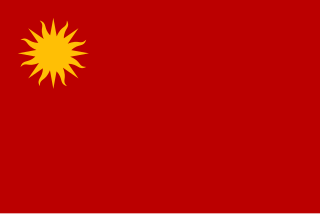
Uruguay, officially the Oriental Republic of Uruguay or the Eastern Republic of Uruguay, is a country in South America. It shares borders with Argentina to its west and southwest and Brazil to its north and northeast; while bordering the Río de la Plata to the south and the Atlantic Ocean to the southeast. It is part of the Southern Cone region of South America. Uruguay covers an area of approximately 181,034 square kilometers (69,898 sq mi) and has a population of an estimated 3.4 million, of whom around 2 million live in the metropolitan area of its capital and largest city, Montevideo.

The politics of Uruguay abide by a presidential representative democratic republic, under which the President of Uruguay is both the head of state and the head of government, as well as a multiform party system. The president exercises executive power and legislative power and is vested in the two chambers of the General Assembly of Uruguay. The Judiciary is independent from the executive and legislature.

Raúl Ricardo Alfonsín was an Argentine lawyer and statesman who served as President of Argentina from 10 December 1983 to 8 July 1989. He was the first democratically elected president after more than seven years of military dictatorship, and is considered the "father of modern democracy in Argentina". Ideologically, he identified as a Radical and a social democrat, serving as the leader of the Radical Civic Union from 1983 to 1991, 1993 to 1995, 1999 to 2001, with his political approach being known as "Alfonsinism".

The Colorado Party is a liberal political party in Uruguay.

Julio María Sanguinetti Coirolo is a Uruguayan politician, lawyer and journalist, who twice served as President of Uruguay for the Partido Colorado.

Hernán Siles Zuazo was a Bolivian politician who served as the 46th president of Bolivia twice nonconsecutively from 1956 to 1960 and from 1982 to 1985. He also briefly served as interim president in April 1952, and as the 27th vice president of Bolivia from 1952 to 1956.

Gregorio Conrado Álvarez Armelino, also known as El Goyo, was an Uruguayan Army general who served as president of Uruguay from 1981 until 1985 and was the last surviving president of the civic-military dictatorship.

Uruguay elects on national level a head of state – the president – and a legislature.

The Movement of Popular Participation is a Uruguayan political party. It is a member organisation of the left-wing Broad Front coalition.

The Constitution of Uruguay is the supreme law of Uruguay. Its first version was written in 1830 and its last amendment was made in 2004.
José D'Elía was a Uruguayan labor leader and politician.

The cinema of Uruguay has a role in the culture of Uruguay and is a part of Latin American cinema. Since the late 1990s, Uruguayan cinema has undergone a process of evolution, during which its films have received positive reviews and been internationally recognized. Over 120 films, fiction and non-fiction, have been produced since then.
Rafael Michelini Delle Piane is a Uruguayan politician. He is currently Senator of the Republic of Uruguay as a member of the Frente Amplio party, and was the founder of New Space party. He was the seventh of ten children, and is the son of Zelmar Michelini, a former senator who was assassinated in Buenos Aires during Operation Condor. As a result, he has been active in human rights issues, primarily those stemming from the dictatorship.

The civic-military dictatorship of Uruguay (1973–85), also known as the Uruguayan Dictatorship, was an authoritarian military dictatorship that ruled Uruguay for 12 years, from June 27, 1973 until March 1, 1985. The dictatorship has been the subject of much controversy due to its violations of human rights, use of torture, and the unexplained disappearances of many Uruguayans. The term "civic-military" refers to the military regime's relatively gradual usurpation of power from civilian presidents who continued to serve as head of state, which distinguished it from dictatorships in other South American countries in which senior military officers immediately seized power and directly served as head of state.

Líber Seregni Mosquera was a Uruguayan military officer and politician. In his youth he was a member of the Colorado Party. Under successive governments of that party, he had a successful military career until his retirement in 1968.

Wilson Ferreira Aldunate (1919–1988) was a Uruguayan politician and a historically important member of the National Party.

A constitutional referendum was held in Uruguay on 25 November 1917. Amongst the changes to the system of government, the new constitution would create a National Council of Administration alongside the presidency. The National Council of Administration would have nine members; six from the winning party and three from the runner-up party. The proposals were approved by 95.15% of voters. The result was confirmed by the Senate on 18 December, and the new constitution came into force on 1 March 1919.

General elections were held in Uruguay on 28 November 1971, alongside a double referendum. The result was a victory for the Colorado Party, which won the presidency and the most seats in the Chamber of Deputies and Senate.
Uruguayans in Spain are people born in Uruguay who emigrated to Spain. As of 2022, there are over 80,000 Uruguayans living in Spain, mostly in Catalonia.

Emigration from Uruguay is a migratory phenomenon that has been taking place in Uruguay since the early 20th century.














